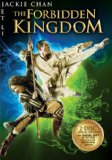| Reviews & Columns |
|
Reviews DVD TV on DVD Blu-ray 4K UHD International DVDs In Theaters Reviews by Studio Video Games Features Collector Series DVDs Easter Egg Database Interviews DVD Talk Radio Feature Articles Columns Anime Talk DVD Savant Horror DVDs The M.O.D. Squad Art House HD Talk Silent DVD
|
DVD Talk Forum |
|
|
| Resources |
|
DVD Price Search Customer Service #'s RCE Info Links |
|
Columns
|
|
|
Forbidden Kingdom, The
Lionsgate Home Entertainment // PG-13 // September 9, 2008
List Price: $34.98 [Buy now and save at Amazon]
If the first films that pop into mind when I mention Jackie Chan and Jet Li are the likable Rush Hour and Unleashed respectfully, then Forbidden Kingdom might seem quite impressive. As whimsical martial arts fantasies go, Rob Minkoff's Westernized remodeling of an ancient Chinese fable is a stimulating departure from the likes of other recent fantastical choreography films from China and South Korea. However, if the likes of Drunken Master and Tai Chi Master or Police Story and Fist of Legend are your familiarities with Chan and Li, this highly-anticipated conflagration more geared towards a "broader" audience might be a bit of a letdown. There's quite a few satisfying Yuen Wo Ping choreographed battles that detonate within Forbidden Kingdom, but it's a film much more concentrated on aesthetics and wider-ranged audience acclimation over quality narrative and the blitzed martial arts that we'd come to expect.
The Film:
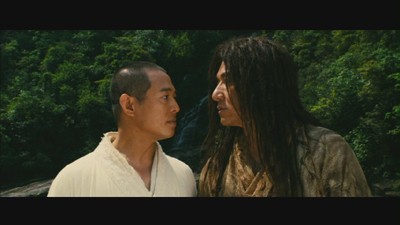
In order to reach the shiny little treasures within Minkoff's film, you've got to sludge through some middling filmmaking that involves Jason (Michael Angarano), a young Boston teenager, as he stews in his bedroom amid hours of kung-fu marathons. He's obsessed with the classics, like 36th Chamber of Shaolin and older Bruce Lee flicks, while also concentrating on specific styles and stances for his "research". Minkoff gives generous nods abound to influential martial arts films in the "real world", such as to Come Drink With Me and the great Bride With White Hair -- a wuxia fantasy choreographed by Yuen Wo Ping and photographed by Forbidden Kingdom cinematographer Peter Pau. If this fish-and-reel pull into the world of kung-fu cinema does nothing but spark more interest in the likes of Bride With White Hair, then I'd be a happy camper.
These nudges to genre fans are the high points of its disjointed modern beginning. Forbidden Kingdom loosely molds onto an adaptation to the 15th century fable "Journey to the West", only becoming visible as we begin to discover the shop where Jason snags his kung-fu bootlegs. His wide-eyed, kid-in-a-candy-store energy leads him into the back room of the owner's store, a mini museum of sorts revolving around older Chinese martial arts culture. There, he spots a giant golden staff that seems strangely familiar to Jason -- possibly from his dreams. When a group of bigoted thugs who use Jason to their advantage rob the store, an accident claims the life of the old man and lands Jason knocked out with that same golden staff in his hands. Oddly, though fairly identifiable early on, Jackie Chan plays the part of the old man -- and, seeing as how the film's English language hinge is a necessity, his accented dialogue works well in this role.
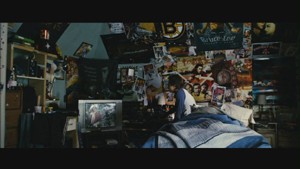
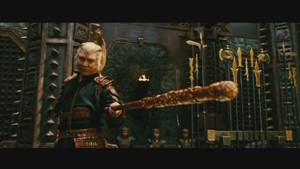
When Jason wakes up, he's in Ancient China -- the real setting for Forbidden Kingdom. We don't get settle in and comfortable until we see the lush scenery and lurid colors of older times which, oddly, will be recognized by those who have seen the blistering greens of the transcendental rice patties in Fearless. Whether it's a purposeful trick to attract reminiscent Jet Li fans is beyond me -- but it works for a smile. Much of the set design intentionally reminds the viewer of many different martial arts films from the past, providing a soaking-in experience to try and acclimate genre fans as well. Once we seep into their world and Forbidden Kingdom transforms into its fantasy-based whirlwind strangely familiar to the trek of the ring in Lord of the Rings, it's mostly "business as usual" for the choreographer and cinematographer responsible for some of the genre's more prominent additions.
Shortly after I discovered "Journey to the West", I also found out that Chan and Jet Li would be participating in this visualization of the story. After doing some reading into the narrative, its key characters, and the thematic messages behind the fable, anticipation got the best of me. But I'm not going to lie: hearing about an American director adapting the legend with a modernized spin that involved a teenage Western kid was a rather high deterrent. Rightfully so; including the half humdrum / half energetic performance from Michael Angarano, they are without question the weakest elements of Forbidden Kingdom. Writer John Fusco, a martial arts enthusiast in his own right who also penned the surprisingly solid Hidalgo, has some solid concepts at play with this adaptation that fizzle out in melodramatic fashion. They're tolerable problems, but they also trip out the footing of a film with a great ancient tale lying underneath its premise and a noticeably solid dynamic between two of China's most recognizable legends.
As for the rest of the performances, they range from bearable to inspired. Chan's immortal vagrant master reliant on alcohol as his inspiration ("elixir") is a cute nod to his role in Drunken Master, one that echoes in his alcohol-inspired style. We are also graced with Crystal Liu's strong performance, a strong feminine presence in the film who helps to counterbalance all the testosterone present as the young warrioress Golden Sparrow. Jet Li, however, steals the show from underneath the entire cast as both the White Monk and the dazzling portrayal of the Monkey King. In one, he's stoic and brutally intricate, whereas on the side of the immortal half-primate he's a lively and bizarrely captivating character. His scenes as the Monkey King, especially those that take place in the land of the immortals, are insatiably splendid ... and I loved every minute of them.
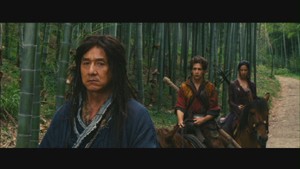
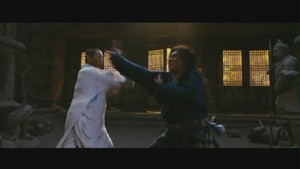
Sadly, they also reinforced my desire for a pure, high-budget "Journey to the West" film by itself. Everything hinges on reclaiming the lost staff of the Monkey King, while all else seems like meddled filler to do little more than help it float between battles. But Forbidden Kingdom's outstanding visual composition, great-in-strides choreography, and reflective style of acting and narrative craftsmanship help to construct an attractive and whimsical adventure out of Minkoff and Fusco's adaptive ideas. Some decisions -- like the selection of each character in Jason's soundstage to speak in English instead of his character molding to the universe to speak the native tongue, or the incorporation of some poorly-implemented teenage "woe is me" theatrics that remind me of that Chuck Norris teenage-dream flick Sidekicks -- still manage to make the film feel out of place in its own skin.
The one-two punch of Yuen Wo Ping's imagination and Peter Pau's lush eye for composing both fast-paced scenes and dramatic close-ups helps to alleviate those nagging qualms and missed opportunities. In all, the quest for the Monkey King's golden staff opts for easy digestion as an almost family-based adventure over aggressive faithfulness to the cultural ideals underneath. Though an indisputably flawed opportunity on a Hollywood-sized budget, I still enjoyed Forbidden Kingdom more than expected. Take Minkoff's whimsical film at surface value without expecting a hugely affective experience and you'll find something satisfying and fun.
The DVD:
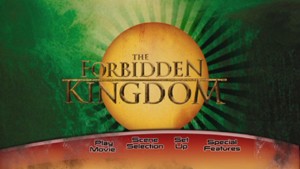
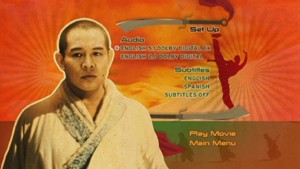
Lions Gate's double-disc presentation of The Forbidden Kingdom comes with artwork reminiscent of a '70s style kung-fu bootleg DVD design, a neat little nod to the light usage of certain DVD covers and such in the film. The animated menus carry a similar kitschy feel as well, accompanied by a similar-sounding attitude to that of the artwork. It comes with a slipcover, covered with a lenticular front for your twisting and reflective pleasure.
The Video:
Presented in a 2.39:1 anamorphic widescreen image, Forbidden Kingdom harnesses a load of visual prowess from the get-go. Color saturation is exquisite, rendering lurid shades of green, orange, and darker purples and blues fantastically. Detail is generally quite good for a film with so many intricate elements flying about at once. However, it's not a perfect transfer in the slightest; noise and compression remnants are easily seen here, giving a little bit of the radiation effect around many of the character's body edges. There's a mess of nasty pixilation present in faces and along many scenic edges as well. Black levels are generally handled well, but they're also quite noisy -- especially in the darker shop scenes. It's not a terrible transfer, but it could've been a heck of a lot better.
The Audio:
Where the picture leaves a bit to be desired, this English (90%) / Mandarin (10%) 5.1 Dolby Digital EX track is surprisingly lively. Most prominent is the fantastic utilization of the rear channels, spreading cleanly across the audible rear outreaches quite well. The spinning of the illustrious staff and the spiraling and whooshing effect create a nice sense of three-dimensionality. The lower-frequency bass channel is also utilized well, both in lower thuds and in the mid-range bass effects like wobbling and clanging metal. Verbal clarity is relatively good, though the English-spoken efforts from Chan and Li are a little hard to discern from the track. Overall, everything from the smooth musical score to the ridiculously active effects are all solidly executed. Optional English and Spanish subtitles are available. One thing for Spanish-speaking viewers: The English subtitles for the few Mandarin portions are BURNT-IN.
The Extras:
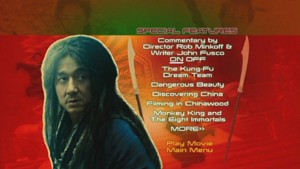
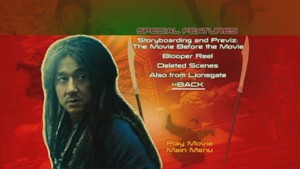
Commentary with Director Minkoff and Writer Fusco:
This feature-length commentary features a gradual stream of somewhat surface-level information about photography and conceptual ideas that slyly allude to the film's cultural aspects. It does, however, sporadically give nice tidbits about the film, like the influences utilized from Come Drink With Me and Bride With White Hair as well as Yuen Wo-Ping's added influences throughout the film. It's a nice listen that enjoys pointing out continuity errors and sly editing techniques to try and compensate for some of these fumbles.
Kung Fu Dream Team:
As to be expected, this eleven-minute (11) featurette discusses bringing Jackie Chan and Jet Li together for their first shared film. It talks about their near-collaborative history that stretches back 15 years to their times with the same company. There's plenty of discusses interwoven here about how the choreography was molded to containing both of their unique styles to the sequences.
Dangerous Beauty:
Here, both the Golden Sparrow and the White-haired Demoness are discussed in detal for close to six (6) minutes. It plows through both Crystal Liu and Li Bingbing's histories in telelvision, as well as how they tried to compete on-screen with the blooming charismas of the film's two stars.
Discovering China:
We follow the crew as they scout the Chinese countryside for prime filming locations in both desert and wooden climates. An accompanying map points out each location's position in China, while the footage also showcases several of the prominent "tourist"-y areas that the production crew used for the film. It's about eight (8) minutes of gorgeous scenery and the crew's cathartic experience in discovering these nearly-untapped locales.
Filming in Chinawood:
One of the more interesting featurettes, this near eight-minute (8) piece showcases the magical Hengdian World Studios film lot. Many larger Chinese productions have utilized the space, which proved very useful for the larger scope of Forbidden Kingdom's photography. It shows how the crew tinkered with many of the sets to acclimate to the needs of the storyline, as well as how they received permission to destroy one of the sets for a scene in the film. They also describe how they built the sets for the American portions in a Chinese stage, which is rather interesting.
Monkey King and the Eight Immortals:
Writer John Fusco receives a lot of the spotlight in this mine-minute (9) featurette as he discusses the translation of his combination story of "Journey to the West" and the teenage boy. He discusses his affair with martial arts and its cinema, referring to the film as a "love letter" to the object of his affection. He talks about his practice, his influences, and how it shaped him as a person a little bit. The core of the material he discusses, of course, discusses the nature of both the Monkey King and the drunken immmortal's histories.
Storyboards and Previz:
As to be expected, there was a lot of visual effects work utilized in Forbidden Kingdom. This six-minute (6) featurette focuses on how storyboards and pre-rendered animations of the high-octane CG scenes were utilized in the film's composition. Several shots of the pre-visualization work makes its way into the featurette, which is surprisingly accurate to the scenes in the film.
Also included are seven-minutes of goofs assembled for a Blooper Reel, as well as a slew of Deleted Scenes. Whether Minkoff was kidding or not can't really be known; however, he refers to a "Director's Cut" during a kissing scene. It very well could've been a statement in jest, or we might see some additional footage from these deleted scenes in an "Unrated Director's Cut" somewhere down the line.
Disc 2 is the Digital Copy disc for Forbidden Kingdom -- and nothing more. I wish that Lions Gate would've spread some of the extras onto the second disc, leaving some more breathing room for the mediocre transfer. This second disc "will not function in a stand-alone DVD player", as per the disc's label.
-----
Final Thoughts:
Writer John Fusco mentions in the supplemental material for The Forbidden Kingdom that he, and I'm paraphrasing here, wanted to appeal to and influence younger western people to embrace its many blunt references to great kung-fu films as a lure towards their cinema. In that, he describes the mood of Forbidden Kingdom as well: full of influence and richly developed, but with an unfocused scope in mind. In that right, his loosely-based Jackie Chan / Jet Li adaptation to the tale of the Monkey King is a grand effort with rich visuals and spots of great choreography, but ultimately not the grand experience that it potentially could be. It's still a very entertaining martial arts fantasy, however, with beautiful composition. Lions Gate's DVD looks decent and sounds fantastic, but the core of its solidity comes from a slew of nicely-segmented bonus material. It's a decent package that comes Recommended to anyone with a desire to see a Chan / Lee battle, fans of martial arts fantasies, or anyone looking for a vibrant adventure film.
Thomas Spurlin, Staff Reviewer -- DVDTalk Reviews | Personal Blog/Site
The Film:

In order to reach the shiny little treasures within Minkoff's film, you've got to sludge through some middling filmmaking that involves Jason (Michael Angarano), a young Boston teenager, as he stews in his bedroom amid hours of kung-fu marathons. He's obsessed with the classics, like 36th Chamber of Shaolin and older Bruce Lee flicks, while also concentrating on specific styles and stances for his "research". Minkoff gives generous nods abound to influential martial arts films in the "real world", such as to Come Drink With Me and the great Bride With White Hair -- a wuxia fantasy choreographed by Yuen Wo Ping and photographed by Forbidden Kingdom cinematographer Peter Pau. If this fish-and-reel pull into the world of kung-fu cinema does nothing but spark more interest in the likes of Bride With White Hair, then I'd be a happy camper.
These nudges to genre fans are the high points of its disjointed modern beginning. Forbidden Kingdom loosely molds onto an adaptation to the 15th century fable "Journey to the West", only becoming visible as we begin to discover the shop where Jason snags his kung-fu bootlegs. His wide-eyed, kid-in-a-candy-store energy leads him into the back room of the owner's store, a mini museum of sorts revolving around older Chinese martial arts culture. There, he spots a giant golden staff that seems strangely familiar to Jason -- possibly from his dreams. When a group of bigoted thugs who use Jason to their advantage rob the store, an accident claims the life of the old man and lands Jason knocked out with that same golden staff in his hands. Oddly, though fairly identifiable early on, Jackie Chan plays the part of the old man -- and, seeing as how the film's English language hinge is a necessity, his accented dialogue works well in this role.


When Jason wakes up, he's in Ancient China -- the real setting for Forbidden Kingdom. We don't get settle in and comfortable until we see the lush scenery and lurid colors of older times which, oddly, will be recognized by those who have seen the blistering greens of the transcendental rice patties in Fearless. Whether it's a purposeful trick to attract reminiscent Jet Li fans is beyond me -- but it works for a smile. Much of the set design intentionally reminds the viewer of many different martial arts films from the past, providing a soaking-in experience to try and acclimate genre fans as well. Once we seep into their world and Forbidden Kingdom transforms into its fantasy-based whirlwind strangely familiar to the trek of the ring in Lord of the Rings, it's mostly "business as usual" for the choreographer and cinematographer responsible for some of the genre's more prominent additions.
Shortly after I discovered "Journey to the West", I also found out that Chan and Jet Li would be participating in this visualization of the story. After doing some reading into the narrative, its key characters, and the thematic messages behind the fable, anticipation got the best of me. But I'm not going to lie: hearing about an American director adapting the legend with a modernized spin that involved a teenage Western kid was a rather high deterrent. Rightfully so; including the half humdrum / half energetic performance from Michael Angarano, they are without question the weakest elements of Forbidden Kingdom. Writer John Fusco, a martial arts enthusiast in his own right who also penned the surprisingly solid Hidalgo, has some solid concepts at play with this adaptation that fizzle out in melodramatic fashion. They're tolerable problems, but they also trip out the footing of a film with a great ancient tale lying underneath its premise and a noticeably solid dynamic between two of China's most recognizable legends.
As for the rest of the performances, they range from bearable to inspired. Chan's immortal vagrant master reliant on alcohol as his inspiration ("elixir") is a cute nod to his role in Drunken Master, one that echoes in his alcohol-inspired style. We are also graced with Crystal Liu's strong performance, a strong feminine presence in the film who helps to counterbalance all the testosterone present as the young warrioress Golden Sparrow. Jet Li, however, steals the show from underneath the entire cast as both the White Monk and the dazzling portrayal of the Monkey King. In one, he's stoic and brutally intricate, whereas on the side of the immortal half-primate he's a lively and bizarrely captivating character. His scenes as the Monkey King, especially those that take place in the land of the immortals, are insatiably splendid ... and I loved every minute of them.


Sadly, they also reinforced my desire for a pure, high-budget "Journey to the West" film by itself. Everything hinges on reclaiming the lost staff of the Monkey King, while all else seems like meddled filler to do little more than help it float between battles. But Forbidden Kingdom's outstanding visual composition, great-in-strides choreography, and reflective style of acting and narrative craftsmanship help to construct an attractive and whimsical adventure out of Minkoff and Fusco's adaptive ideas. Some decisions -- like the selection of each character in Jason's soundstage to speak in English instead of his character molding to the universe to speak the native tongue, or the incorporation of some poorly-implemented teenage "woe is me" theatrics that remind me of that Chuck Norris teenage-dream flick Sidekicks -- still manage to make the film feel out of place in its own skin.
The one-two punch of Yuen Wo Ping's imagination and Peter Pau's lush eye for composing both fast-paced scenes and dramatic close-ups helps to alleviate those nagging qualms and missed opportunities. In all, the quest for the Monkey King's golden staff opts for easy digestion as an almost family-based adventure over aggressive faithfulness to the cultural ideals underneath. Though an indisputably flawed opportunity on a Hollywood-sized budget, I still enjoyed Forbidden Kingdom more than expected. Take Minkoff's whimsical film at surface value without expecting a hugely affective experience and you'll find something satisfying and fun.
The DVD:


Lions Gate's double-disc presentation of The Forbidden Kingdom comes with artwork reminiscent of a '70s style kung-fu bootleg DVD design, a neat little nod to the light usage of certain DVD covers and such in the film. The animated menus carry a similar kitschy feel as well, accompanied by a similar-sounding attitude to that of the artwork. It comes with a slipcover, covered with a lenticular front for your twisting and reflective pleasure.
The Video:
Presented in a 2.39:1 anamorphic widescreen image, Forbidden Kingdom harnesses a load of visual prowess from the get-go. Color saturation is exquisite, rendering lurid shades of green, orange, and darker purples and blues fantastically. Detail is generally quite good for a film with so many intricate elements flying about at once. However, it's not a perfect transfer in the slightest; noise and compression remnants are easily seen here, giving a little bit of the radiation effect around many of the character's body edges. There's a mess of nasty pixilation present in faces and along many scenic edges as well. Black levels are generally handled well, but they're also quite noisy -- especially in the darker shop scenes. It's not a terrible transfer, but it could've been a heck of a lot better.
The Audio:
Where the picture leaves a bit to be desired, this English (90%) / Mandarin (10%) 5.1 Dolby Digital EX track is surprisingly lively. Most prominent is the fantastic utilization of the rear channels, spreading cleanly across the audible rear outreaches quite well. The spinning of the illustrious staff and the spiraling and whooshing effect create a nice sense of three-dimensionality. The lower-frequency bass channel is also utilized well, both in lower thuds and in the mid-range bass effects like wobbling and clanging metal. Verbal clarity is relatively good, though the English-spoken efforts from Chan and Li are a little hard to discern from the track. Overall, everything from the smooth musical score to the ridiculously active effects are all solidly executed. Optional English and Spanish subtitles are available. One thing for Spanish-speaking viewers: The English subtitles for the few Mandarin portions are BURNT-IN.
The Extras:


Commentary with Director Minkoff and Writer Fusco:
This feature-length commentary features a gradual stream of somewhat surface-level information about photography and conceptual ideas that slyly allude to the film's cultural aspects. It does, however, sporadically give nice tidbits about the film, like the influences utilized from Come Drink With Me and Bride With White Hair as well as Yuen Wo-Ping's added influences throughout the film. It's a nice listen that enjoys pointing out continuity errors and sly editing techniques to try and compensate for some of these fumbles.
Kung Fu Dream Team:
As to be expected, this eleven-minute (11) featurette discusses bringing Jackie Chan and Jet Li together for their first shared film. It talks about their near-collaborative history that stretches back 15 years to their times with the same company. There's plenty of discusses interwoven here about how the choreography was molded to containing both of their unique styles to the sequences.
Dangerous Beauty:
Here, both the Golden Sparrow and the White-haired Demoness are discussed in detal for close to six (6) minutes. It plows through both Crystal Liu and Li Bingbing's histories in telelvision, as well as how they tried to compete on-screen with the blooming charismas of the film's two stars.
Discovering China:
We follow the crew as they scout the Chinese countryside for prime filming locations in both desert and wooden climates. An accompanying map points out each location's position in China, while the footage also showcases several of the prominent "tourist"-y areas that the production crew used for the film. It's about eight (8) minutes of gorgeous scenery and the crew's cathartic experience in discovering these nearly-untapped locales.
Filming in Chinawood:
One of the more interesting featurettes, this near eight-minute (8) piece showcases the magical Hengdian World Studios film lot. Many larger Chinese productions have utilized the space, which proved very useful for the larger scope of Forbidden Kingdom's photography. It shows how the crew tinkered with many of the sets to acclimate to the needs of the storyline, as well as how they received permission to destroy one of the sets for a scene in the film. They also describe how they built the sets for the American portions in a Chinese stage, which is rather interesting.
Monkey King and the Eight Immortals:
Writer John Fusco receives a lot of the spotlight in this mine-minute (9) featurette as he discusses the translation of his combination story of "Journey to the West" and the teenage boy. He discusses his affair with martial arts and its cinema, referring to the film as a "love letter" to the object of his affection. He talks about his practice, his influences, and how it shaped him as a person a little bit. The core of the material he discusses, of course, discusses the nature of both the Monkey King and the drunken immmortal's histories.
Storyboards and Previz:
As to be expected, there was a lot of visual effects work utilized in Forbidden Kingdom. This six-minute (6) featurette focuses on how storyboards and pre-rendered animations of the high-octane CG scenes were utilized in the film's composition. Several shots of the pre-visualization work makes its way into the featurette, which is surprisingly accurate to the scenes in the film.
Also included are seven-minutes of goofs assembled for a Blooper Reel, as well as a slew of Deleted Scenes. Whether Minkoff was kidding or not can't really be known; however, he refers to a "Director's Cut" during a kissing scene. It very well could've been a statement in jest, or we might see some additional footage from these deleted scenes in an "Unrated Director's Cut" somewhere down the line.
Disc 2 is the Digital Copy disc for Forbidden Kingdom -- and nothing more. I wish that Lions Gate would've spread some of the extras onto the second disc, leaving some more breathing room for the mediocre transfer. This second disc "will not function in a stand-alone DVD player", as per the disc's label.
-----
Final Thoughts:
Writer John Fusco mentions in the supplemental material for The Forbidden Kingdom that he, and I'm paraphrasing here, wanted to appeal to and influence younger western people to embrace its many blunt references to great kung-fu films as a lure towards their cinema. In that, he describes the mood of Forbidden Kingdom as well: full of influence and richly developed, but with an unfocused scope in mind. In that right, his loosely-based Jackie Chan / Jet Li adaptation to the tale of the Monkey King is a grand effort with rich visuals and spots of great choreography, but ultimately not the grand experience that it potentially could be. It's still a very entertaining martial arts fantasy, however, with beautiful composition. Lions Gate's DVD looks decent and sounds fantastic, but the core of its solidity comes from a slew of nicely-segmented bonus material. It's a decent package that comes Recommended to anyone with a desire to see a Chan / Lee battle, fans of martial arts fantasies, or anyone looking for a vibrant adventure film.
|
| Popular Reviews |
| Sponsored Links |
|
|
| Sponsored Links |
|
|
| Release List | Reviews | Shop | Newsletter | Forum | DVD Giveaways | Blu-Ray | Advertise |
|
Copyright 2024 DVDTalk.com All Rights Reserved. Legal Info, Privacy Policy, Terms of Use,
Manage Preferences,
Your Privacy Choices | |||||||









